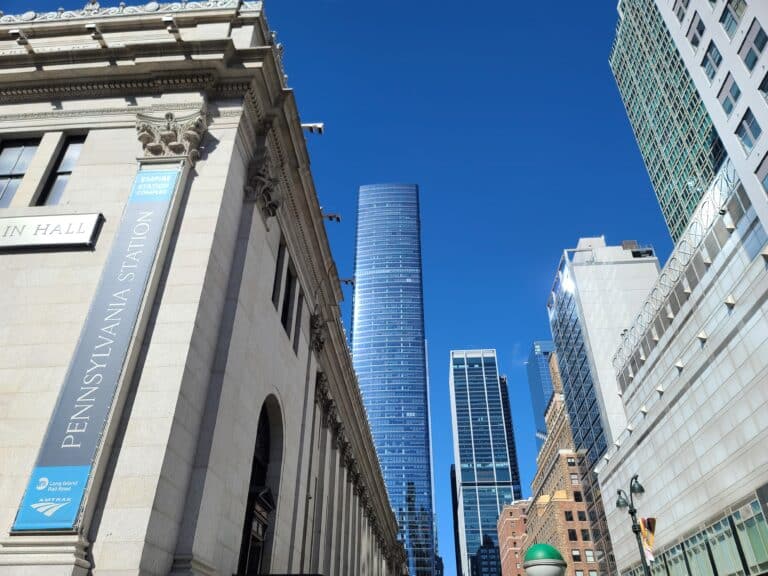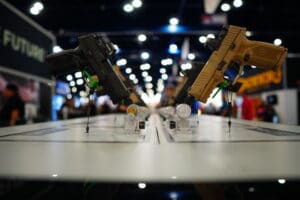Local laws allowing New York City officials to subjectively deny gun possession permits violate the Second Amendment, a federal judge ruled Tuesday.
U.S. District Judge John P. Cronan struck down portions of a New York City law governing when licensing officials may deny permits to own rifles, shotguns, and handguns. Cronan determined that allowing the City to deny licenses to applicants who are “not of good moral character” or when they feel “other good cause” exists allows too much discretion and does not fit with how America historically regulated guns. He found that makes them unconstitutional under the Supreme Court’s latest Second Amendment test.
“This case is not about the ability of a state or municipality to impose appropriate and constitutionally valid regulations governing the issuance of firearm licenses and permits,” Judge Cronan wrote in Srour v. NYC. “The constitutional infirmities identified herein lie not in the City’s decision to impose requirements for the possession of handguns, rifles, and shotguns. Rather, the provisions fail to pass constitutional muster because of the magnitude of discretion afforded to City officials in denying an individual their constitutional right to keep and bear firearms, and because of Defendants’ failure to show that such unabridged discretion has any grounding in our Nation’s historical tradition of firearm regulation.”
The decision, which is likely to be appealed by city officials, may result in more residents of the nation’s largest city being able to legally arm themselves. It also represents the continuing fallout from a landmark gun case ruling handed down by the Supreme Court last year.
The City’s regulations share a distinct similarity to those in a state law that was at issue before the Court in last year’s New York State Rifle and Pistol Association v. Bruen decision. Like the New York City ordinances struck down Tuesday, that case dealt with a process that gave licensing officials subjective discretion to deny gun-carry permits to applicants they determined didn’t have “proper cause” to need a license. The nine justices struck that law down as unconstitutional before establishing a new history-based test gun regulations must clear to be valid.
Judge Cronon, a Donald Trump appointee, drew a comparison to New York’s unconstitutional gun-carry law in his analysis of New York City’s current possession permit scheme. He said the similarities were legally problematic for the City’s defense.
“The Challenged Firearms Provisions empower a City licensing official to decide not to issue a permit or license for a firearm based on that official’s discretionary assessment of the applicant’s ‘good moral character’ and the determination of a vaguely defined presence of ‘good cause,'” he wrote. “Much like the ‘proper-cause’ inquiry invalidated in Bruen, permitting denial of a firearms license based on a government official’s ‘good moral character’ or ‘good cause’ assessment has the effect of ‘prevent[ing] law abiding citizens with ordinary self defense needs from exercising their right to keep and bear arms.'”
Cronon then turned to potential historical analogues cited by the City as justification for its gun-permitting restrictions. The City cited Founding-era laws denying arms rights to groups it said were deemed “dangerous or potentially dangerous,” such as slaves, Native Americans, and persons who would not take loyalty oaths. Cronon rejected the comparisons.
“A law preventing a person who is ‘dangerous or potentially dangerous’ from possessing a firearm is hardly analogous to denying someone their Second Amendment’s rights based on a City official’s discretionary determination that that person ‘lacks good moral character’ or that ‘good cause’ exists,” he wrote. “The latter is far broader and sweeps in significantly more conduct.”
He also rejected comparisons to historical surety laws that required suspected lawbreakers to post a bond as a pledge to keep the peace. Additionally, he wasn’t persuaded by colonial-era statutes in Massachusetts and New Hampshire that allowed justices of the peace to arrest and disarm people for certain offenses. He argued they weren’t closely related to the City’s gun possession restrictions.
“The challenged New York City regulations, meanwhile, apply broadly to those seeking to possess a firearm,” Cronan wrote. “And nothing in either the Massachusetts or New Hampshire statute provides a burden on the right to bear arms comparable to a holistic and discretionary assessment of an individual’s character or other unspecified good cause prior to that individual’s ability to exercise their right to possess a firearm. The fact that justices of the peace in those states were empowered to take firearms instead indicates that but for the specified activity—e.g., fighting, rioting, or disturbing or breaking the peace—the right to possess those arms was presumed.”
The challenge was brought by Joseph Srour, a city resident who unsuccessfully applied with the NYPD for a permit to possess rifles and shotguns in his home in 2018. He also applied for a license to keep handguns in his home in 2019. Both of his applications were denied on the grounds that Srour had “shown poor moral judgment and an unwillingness to abide by the law.”
Srour later unsuccessfully appealed his license application denials, at which point the City explicitly referenced his record of two arrests in the mid-1990s for undisclosed offenses—for which the charges were ultimately dismissed. It also cited a series of traffic violations, including “two criminal court summonses for ‘Navigational Law’ violations, twenty-eight driving violations, twenty-four driver license suspensions, and six driver license revocations,” as the grounds for denial.
Srour then filed suit against the City in January 2022.
The New York City Law Department did not respond to a request for comment on the ruling. However, as often happens in federal cases, Judge Cronon stayed his decision through October 26 to allow the City time to appeal.





2 Responses
The “who can own and carry” question is actually pretty simple –
Can the person vote? That is, based on a person’s status / criminal history, are they allowed to vote (exercise another fundamanetal constitutional right)?
We on “the pro-constitutio” side need to tie these rights together.
Does drug use remove one’s right to vote?
Does a history of traffic tickets (seriously?!?) remove one’s right to vote?
Can we require mandatory training (history, civics, law) classes and tests to vote?
Do we allow a social media search and review before allowing someone to vote?
No.
So why can we require those (at considerable cost and time commitment) for the exercise of firearms rights?
We must end the double-standard between these rights (and gather other rights into the same corral). It would seem to be a useful and persuasive argument….
Yea, that’s an argument I often hear from gun-rights advocates. I think it’s one that has some sway with the Supreme Court too. Chief Justice John Roberts had a line of questioning that was similar to this in the Bruen oral arguments.